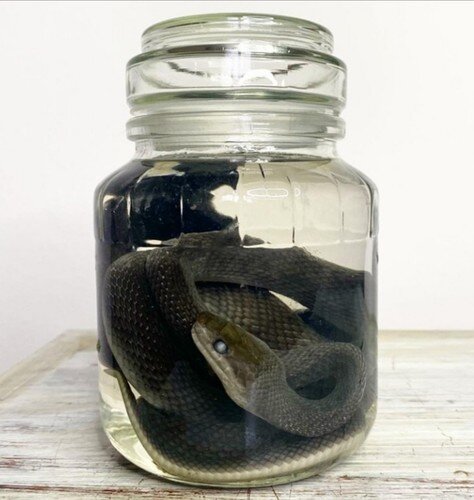Clearly kingsnakes get their name from their nature of being able to eat other snakes. Speaking of North American kingsnake species, are there any snakes that they should not be fed for health concerns, ie: non-native species? For example, a baby ball python or boa of appropriate size that may need to be culled due to birth defect or something of the sorts? Pre-killed, but looking for an alternative to avoid just “throwing away” an animal that would need culled should the time come.
No, not that I’m aware. I’m not aware of any legitimately poisonous snakes that would cause issues to the kingsnake.
However, be careful that your snake doesn’t aquire expensive tastes! Kingsnakes will happily exist on nice, cheap mice.
I know of people who freeze their cull snakes and sell them as frozen thaw feeder snakes to people who keep fussier snake-eating-snakes. Like owners of King cobras.
That is a concern to keep in mind for sure. Currently my kings have not seemed picky, thinking just about everything is food. I’d hate for them to have only a taste for the “finer things”.
That is a useful suggestion to avoid feeling as if I’m wasting a life.
Personally, I send mine to a lady who does insect mounts and wet specemins. She pays for the postage and turns them into display items that she sells. There seems to be a bit of a hobby following for collecting bones and dead things in jars! I like the fact that they’ll be admired still after death, rather than biodegrading away or being digested.
DeadSet for the UK & interested.
Here’s the one of my group of five wild caught black African house snakes that didn’t make it.
Another interesting take on how to eliminate waste! Even if not offered up for sale, the specimens could be preserved in various manners for educational purposes as well.
I know a guy who buys snakes for this very purpose.
Tiger keelbacks, Rhabdophis tigrinus, have nuchal glands and secrete poison. That said, I am fairly sure they are not in the hobby so probably not a concern
.
.
.
As long as the animal did not expire from an infectious disease or parasite, you should be fine feeding it off regardless of species. I have feed my BHP N.Am colubrids and African balls to no ill effect.
I also would not worry overly much about a king imprinting on a specific food item, they are garbage disposals
.
.
Small note here - Just because they can feed on these does not mean they necessarily should feed only on these. A lot of the animals in the hobby actually evolved to feed on something other than European rodents, so their body is not properly equipped to handle them as a full time diet. With the greater availability of different prey types, diet diversity is a great thing
Always appreciate the extra knowledge brought into a subject from you. Even if these aren’t widely available in the hobby, still useful information to me.
I concur with the garbage disposal comparison thus far. I hope the impressive feeding response can continue. I do like to offer various safe alternatives to my animals when possible as a form of “enrichment”. Thanks again for the added input.
This was one of those ‘useless Jeopardy trivia’ things I filed away for those days I am feeling particularly puckish. I like to use it on the armchair experts that go on a “snakes are venomous NOT poisonous” rant against a helpless newbie. Glad to be able to put it to a more normal use here LOL
Big fan of trivia here so I’m here for it!
To my understanding Tiger Keelbacks, like many poisonous reptiles and amphibians, gain their poison due to their diet. If these were to become available in the hobby, would they likely lose their poisonous status if fed the more readily available feeders? Similar to poison dart frogs in captivity?
Most likely, yes… But, I do not know anyone that has them so I cannot swear by that. And also, given they are also venomous, I am not sure I would want to try handling them in an attempt to “milk” the nuchal glands to see if they are still productive or not LOL
Iirc, there was a group of them in an area without poisonous toads and therefore the snakes lacked the poison. It’s been a while since I’ve looked up stuff about yamakagashi/tiger keelbacks so I’m not sure if I could find it again. I’d say it’s likely any specimens kept in captivity would loose their poison over time if fed poison-free foods
Even with that being the case, sounds safe to say that non-CBB should be avoided being fed to your snake eaters unless, as @t_h_wyman mentioned, you’re brave/wild enough to test the Tiger Keelback’s toxicity levels on your own to be sure beforehand.
Fun fact about the Tiger Keelback that I’ve learned since this discussion spurred some additional research on the species. Even if Tiger Keelback eggs are captive hatched, the hatchlings could come out poisonous; mothers in the wild load up on toad toxins while gravid and pass these poisons onto their young.
